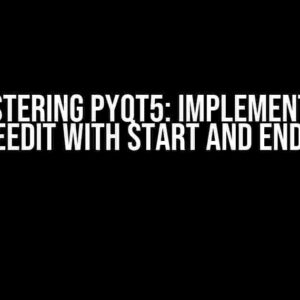Are you tired of encountering the infamous ValueError: max() iterable argument is empty error in your Python code? You’re not alone! This frustrating error can bring your project to a grinding halt, leaving you scratching your head and wondering what went wrong. Fear not, dear programmer, for we’re about to embark on a journey to conquer this error once and for all.
What is the ValueError: max() iterable argument is empty Error?
The ValueError: max() iterable argument is empty error occurs when you attempt to find the maximum value in an empty iterable (such as a list, tuple, or string) using the built-in max() function. This error is raised because the max() function requires at least one element in the iterable to return a value.
my_list = []
print(max(my_list)) # Raises ValueError: max() arg is an empty sequence
Why Does the Error Occur?
The error can occur due to various reasons, including:
-
Empty lists or tuples: When you create an empty list or tuple and then try to find the maximum value using
max(), the error is inevitable. -
Invalid data: If your data is missing or corrupted, it can lead to an empty iterable, resulting in the error.
-
Logical errors: Flawed logic in your code can cause the iterable to be empty, triggering the error.
Solutions to the ValueError: max() iterable argument is empty Error
Now that we’ve identified the reasons behind the error, let’s dive into the solutions to overcome this hurdle:
Solution 1: Check for Empty Iterables
A simple yet effective solution is to check if the iterable is empty before attempting to find the maximum value. You can use a conditional statement to achieve this:
my_list = []
if my_list:
print(max(my_list))
else:
print("The list is empty!")
Solution 2: Use a Default Value
If you want to avoid the error altogether, you can provide a default value to return when the iterable is empty. You can do this by using the default parameter of the max() function:
my_list = []
print(max(my_list, default="No maximum value available"))
Solution 3: Filter Out Empty Iterables
If you’re working with a list of iterables, you can filter out the empty ones before finding the maximum value:
lists = [[], [1, 2, 3], [], [4, 5, 6]]
filtered_lists = [i for i in lists if i]
max_values = [max(i) for i in filtered_lists]
print(max_values) # Output: [3, 6]
Solution 4: Use a Try-Except Block
You can wrap the max() function in a try-except block to catch the ValueError exception and handle it accordingly:
my_list = []
try:
print(max(my_list))
except ValueError:
print("The list is empty!")
Best Practices to Avoid the Error
To avoid encountering the ValueError: max() iterable argument is empty error in the future, follow these best practices:
-
Always validate your data: Ensure that your data is correct and complete before attempting to find the maximum value.
-
Use defensive programming: Anticipate potential errors and handle them proactively using conditional statements or try-except blocks.
-
Test your code: Thoroughly test your code with different scenarios, including edge cases, to catch errors early on.
Real-World Scenarios and Applications
The ValueError: max() iterable argument is empty error can occur in various real-world scenarios, such as:
| Scenario | Description |
|---|---|
| Data Analysis | Finding the maximum value in a dataset, such as the highest temperature in a weather dataset. |
| Machine Learning | Computing the maximum value of a feature in a dataset for model training or prediction. |
| Web Development | Retrieving the maximum value from a database query, such as finding the highest rating for a product. |
Conclusion
In conclusion, the ValueError: max() iterable argument is empty error is a common pitfall in Python programming, but it’s easily avoidable with the right strategies. By understanding the reasons behind the error, implementing the solutions provided, and following best practices, you’ll be well-equipped to tackle this error and many more. Remember, a robust and error-free code is just a few lines away!
So, the next time you encounter this error, don’t panic! Simply refer to this comprehensive guide, and you’ll be back to coding in no time.
Frequently Asked Question
Stuck with the “ValueError: max() arg is an empty sequence” error? Don’t worry, we’ve got you covered! Here are some frequently asked questions and answers to help you troubleshoot and resolve this pesky issue.
What does the “ValueError: max() arg is an empty sequence” error mean?
This error occurs when you try to find the maximum value in an empty sequence, such as an empty list, tuple, or string. In other words, the `max()` function can’t find the maximum value because there are no values to compare!
Why is my list or sequence empty in the first place?
There could be several reasons why your list or sequence is empty. Check your code for errors, make sure you’re not accidentally clearing the list, and verify that your data is being loaded correctly. Also, ensure that your list isn’t being filtered or subset to an empty set!
How can I avoid the “ValueError: max() arg is an empty sequence” error?
To avoid this error, you can add a simple check to make sure your sequence is not empty before calling the `max()` function. You can do this using a conditional statement, such as `if my_list:` or `if len(my_list) > 0:`. This way, you’ll only try to find the maximum value if there are actual values to compare!
What if I need to return a default value when the sequence is empty?
In that case, you can use the `default` argument in the `max()` function, like this: `max(my_list, default=value)`. This way, if the sequence is empty, the `max()` function will return the specified default value instead of raising an error!
Can I use this same approach with other functions, like `min()` or `sum()`?
Yes, you can! The same principle applies to other functions that operate on sequences, such as `min()`, `sum()`, `any()`, and `all()`. Always make sure to check if your sequence is not empty before calling these functions, or provide a default value to return in case of an empty sequence!

![ValueError: max() iterable argument is empty [duplicate] – A Comprehensive Guide to Solving the Frustrating Error ValueError: max() iterable argument is empty [duplicate] – A Comprehensive Guide to Solving the Frustrating Error](https://rhea.hkhazo.biz.id/wp-content/uploads/sites/975/2024/07/valueerror-max-iterable-argument-is-empty-duplicate-a-comprehensive-guide-to-solving-the-frustrating-error-with-text.jpg)


